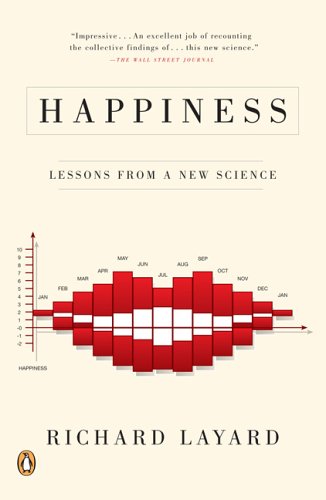Happiness Summary
5 min read ⌚
 Lessons from a New Science
Lessons from a New Science
Speaking of Happiness will always be a topic that can cause an stress and anxiety.
If you haven’t got a clue on how to reach it, stick with us!
Who Should Read “Happiness”? And Why?
Each individual differently understands happiness, it all depends on you. Richard Layard warns people about the possibility of becoming modern slaves to greed and selfishness.
This legible debate of the “new science” of peacefulness evoke some rare and provocative conclusions. Despite these confusing outcomes, the self-help guide “Happiness” is recommended for all people interested in self-development.
About Richard Layard

Richard Layard is a British economist, writer, and an analyst. He was born on March 15th, 1934 in the British Kingdom. Momentarily at the 83 years of age, he works at the Centre for Economic Performance in London.
Richard is also a House of Lords member with several high-quality textbooks written. He spent the majority of his life studying economic subjects and the nature of happiness. From 1997 until 2000, Layard worked for the government as a consultant.
“Happiness Summary”
Jeremy Bentham was the first ever English philosopher who explained the first ever “remarkable happiness principle.” According to his words – even in ancient Rome people were much happier than in areas lesser civilization also known as rural.
The lack of sophistication and prosperity are the main reasons for a depressed community. The most satisfied citizenry is found in peaceful countries, nations which implement practical policies for the sake of their community.
Especially, third-world countries should follow these policies and understand the way of functioning to improve their present situation. Nevertheless, the theoretical aspect is one thing, and action is something different.
While discussing human happiness, the governments avoid using Bentham’s principle under any circumstances as a guide. Westerners promote individualism as the only attribute related to happiness and success. You should avoid misunderstanding and neglect misleading info; prosperous society doesn’t guarantee joyful citizens.
The Western World thinks that by using market statistics, it is possible to measure person’s happiness in all aspects of life. However, a significant portion of scientists are skeptical, and they do not believe that the human nature can easily fit into this economic formula.
In reality, some measurements of happiness are not related to the economy or finance; they are merely spiritual. As explained by businessmen, protecting only your interests is a short-term policy, which will not bring you the joy you hope for. It is quite the opposite; happiness is giving not taking, so be careful what you wish for.
The definition of happiness would probably include aspects like contributing to the society and helping others.
At the beginning of the 20th century, economists were not able to measure factors which influenced the human nature, so they’ve decided to leave that theory aside to other more advanced generations and focus on pressing matters.
It was beyond their capabilities. These experts managed to calculate one nation’s index of wealth and compare it with another one, using specific measurement strategies like the gross national product.
One dilemma emerged out of these calculations – what if a small Asian country – like the country of Bhutan, decides to increase their “gross national happiness”?
How to accomplish that?
Economist Richard Layard struggles to answer these unresolved questions by introducing the audience with lessons linked to the relatively new field of “positive psychology” and societal systems.
Some readers may find this theory unreliable considering the author’s touchy-feely perspective, based on scientific calculations and measurements.
He claims that if politicians were people with integrity – they would advocate for an equal and happy society for all individuals. In order to do so, they will have to change their viewpoints and plan something far greater than ever-expanding marketplaces.
It is a sensation that has to be felt; which leads us to a conclusion – it cannot be explained as a concept.
So, the question is – How to finally resolve this enigma? The author gives us clear tips to follow, although it would be much easier if we have a guide in real life, we must be satisfied with the power of intuition.
Don’t become an ignorant person who seeks answers; maybe the problem lies within the question. Selfishness is another way to make your life miserable. Take this situation, for example, you are walking down the street, and you see a little girl crying. You ignore her call for help and walk right beside her.
If you are not feeling an urge to stop and help, you are already dead inside, beware of not becoming one – a real 21st-century zombie.
Key Lessons from “Happiness”
1. Always have high hopes for yourself
2. Technology has its good and bad sides
3. Develop more flexible approach if you wish to become richer
Always have high hopes for yourself
Feelings are not permanent, not even love. They change many time times even daily because everyone has an established a unique model of happiness.
Studies have shown that people with high baseline levels of satisfaction usually live much longer, than those individuals with lower levels.
Technology has its good and bad sides
The technology has a tremendous impact on our lives. The remarkable things that we (humans) created have a significant influence on our happiness as well.
But, people have to deal with the threats of it – as technology advances, we find it harder to express ourselves. The communication suffers.
Develop more flexible approach if you wish to become richer
Economics has always been a tricky business. It is more than a science with numbers and forecasts.
For instance, economists think that people should be less aversive and adopt a flexible attitude if they want to earn more money (not giving a damn about their other responsibilities).
Like this summary? We’d Like to invite you to download our free 12 min app, for more amazing summaries and audiobooks.
“Happiness ” Quotes
At first glance, happiness seems a little like love: if you have to ask whether you are in it or not, you are probably not. Few of us much care to define it, but by heaven, we know it when we see it. Share on X The more television people watch, the more they overestimate the affluence of other people. And the lower they rate their own relative income. The result is that they are less happy. Share on X We need a revolution in academia, with every social science attempting to understand the causes of happiness. Share on X Viktor Frankl concluded that in the last resort “everything can be taken from a man but one thing, the last of human freedoms—to choose one’s attitude in any given set of circumstances. Share on X External effects are everywhere. Almost every major transaction we make affects other people who are not a party to the transaction. When someone buys a Lexus, he sets a new standard for the street. When a firm advertises a Barbie doll,… Share on XOur Critical Review
The only way to feel happiness is by contributing to the common interest, sacrifice your time for the sake of others. But, that is hardly the case with us.
“Happiness” teaches you to look on the bright side of life, the only drawback is that the people are already familiar with this type of content.
Emir is the Head of Marketing at 12min. In his spare time, he loves to meditate and play soccer.


 Lessons from a New Science
Lessons from a New Science




